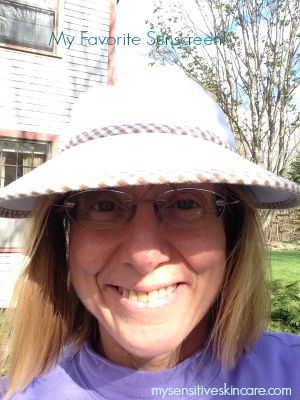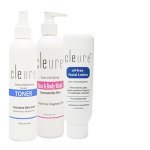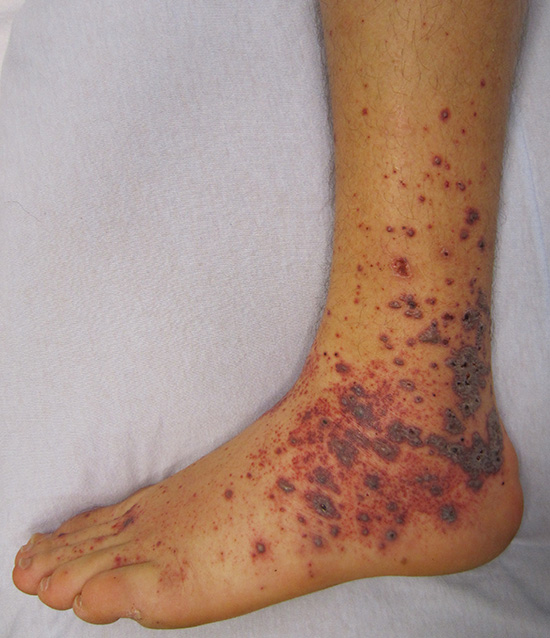Hypoallergenic Sunscreen -
Is It Truly Safe?
A Holistic Look at the Health Effects of
Using Sunblocks
I'll admit... this summer I only used my hypoallergenic sunscreen once! Why after 55 summers of using sunblock did I stop?
I had been faithfully applying a sunblock every summer, after a lifetime of warnings by my Mom, whose whole family developed skin cancer after overdoing it on the beach when they were kids.
Of course, being a good daughter, I took her advice and covered up and slathered on the sunscreen. In recent years, when I learned about toxic chemicals I started using safe hypoallergenic brands.
But... later on this summer I developed some health challenges, and one of the results of my blood tests showed that I had a Vitamin D deficiency!
Now I recorded this podcast (see transcript below) BEFORE getting my test results, but this has caused me to look even more deeply at the whole question of sun exposure and our health.
I haven't totally given up on using sunscreen, but have decided that I'd rather have a few extra wrinkles in exchange for the free and abundant Vitamin D that I receive from moderate sun exposure!
Now, by moderate I mean 15 - 20 minutes a day ... not hours and hours!
I hope you enjoy this podcast, which explores some of the deeper aspects of using sunscreen, and also offer some tips so you can stay safe while still maximizing the important health benefits of moderate sun exposure.
I have added a few comments after the transcript as I've learned some new things since I recorded it!
Podcast Transcript
Welcome everyone to the My Sensitive Skincare show, summer edition! Actually, I'm recording this towards the beginning of summer, but we've got enough sun now that my attention turns once again to the question of sunscreens.
Now, those of you that have visited my website may have seen what I have written about sunscreens, my reviews and experiences of different types of sunscreen products. I do have some new updates on that front, but first I wanted to share with you a deeper look into the whole question of sunscreens and also explore with you some other ways to help prevent sun damage on your skin.
First of all, I just wanted to open up our perspective a little bit, because one of the challenges of the times that we live in . . . One of the many challenges is that due to changes in our climate, there are things going on with our atmosphere, so there tends to be more chance of having sun damage. That's a whole other subject which I'm not going to get into here... but it isn't that things were always this way.
So at this time, we have to do some extra things to prevent sun damage. Also, there have been some major changes in our diet and also in our environment and the way food is grown.
So believe it or not, the way food is grown can actually affect how your skin responds to sun. Nowadays, there aren't a whole lot of minerals in the soils. Those often have to be added artificially, which do help some, but it doesn't take the place of a truly mineralized soil.
Now, again, these are very large topics. But the reason I'm sharing this is just to open up your perspective a little bit about these kind of questions. And it also gives us some hints about other things that we might want to do to prevent sun damage on our skin.
So if we're not getting the same types of nutrition that our ancestors might have gotten even a hundred years ago, there are still some things we can do obviously.
We can try to eat a better diet with foods grown on more organic soils, if possible. It's even possible to grown your own food, even if you live in the city. There are lots of ways now that are becoming very popular. My experience has been food that I grow is so much better than even the nicest supermarket organic produce.
So I have had the experience myself, because sun damage is something I'm very familiar with from my mother and her brothers and sisters. They grew up going to the beach a lot before the days of really being aware of how the sun can affect you, and they were right in the city.
So there wasn't a lot of . . . You know how asphalt and those kind of things actually amplify the sun. So they spent a lot of time at the beach. And then in later years, a lot of them have had to deal with skin damage, even skin cancer. It's been drummed into me since I was young to be very careful of overexposure to the sun.
And my experience with this has been . . . because I do that best I can. But occasionally, I will get a sunburn. And I have found that taking a little bit of extra antioxidants in the days when I used to be able to drink green drinks without getting a headache, I would have a green drink, some extra nutrition when I got a sunburn. I notice that the sunburn resolved a lot faster and with less pain.
We often think... "oh my goodness, if I get a sunburn, I need to apply something to my skin" ... and yes, sometimes that can help also. But believe it or not, internally, there are things you can do such as vitamin C, having more minerals, just giving your body a little bit of extra antioxidant support in whatever way works for you.
If it's not smoothies or green drinks or vegetables, maybe some fruit, something that has a lot of antioxidants in it. That can really make a difference.
Also, there is the question with . . . So a lot of people apply sunscreens in order to prevent sunburn. But there is the question among the scientific community about sunscreens actually limiting the amount of vitamin D that we're getting in our bodies, which is necessary.
Vitamin D is absolutely necessary for our health. Apparently, at least according to some doctors and research scientists, people in the northern latitudes that don't get a lot of sun are vulnerable to a lot more health challenges. So vitamin D is one of those things also. The best way to get it is some kind of a controlled exposure to the sun that doesn't overdo it. But you do have to be careful.
And supplements aren't always as good. There are different types of vitamin C supplements. It's all very complicated. And honestly, I can't even remember all the different things I've read about this. So that's a whole other subject, is vitamin D.
The reason I'm bringing it up is that it's something to look at when you're applying lots of sunscreen that you want to really look at your life, and you don't want to overexpose your skin. But a little bit of sun exposure that's not overdoing it can be healthy. So that's a personal choice. And again, this is too big a topic just for one small podcast. But I wanted to make you aware of it.
I have had the experience of dealing with not wanting to overexpose my skin. And honestly, what I found works the best is long sleeves and a hat. Of course, that's difficult to find too.
I like to have my hair lightened because of my hair color. It's kind of dark blonde. And it can get dark in the winter and turn brown, which doesn't feel quite like me. So I like to have my hair in the sun. So I use visors. But really, what's best in terms of preventing a lot of sun exposure is a wide-brimmed hat, tthat can just keep the sun off of your face. So and those of you that are older, I do have to say it is very nice to be in the sun, but you will get more wrinkles. So that's something to be aware of, too.
Now, then there's the whole question of sunscreens. That's been very, very challenging, because the sunscreens on the market, the ones that you apply and stay on you and don't need to be reapplied all the time. Those ones that we're used to, they are very convenient, carry ingredients in them. They contain ingredients in them that are not that healthy. And you've seen that on my website. So I tend to go for the more natural sunscreens. And also having sensitive skin, it's very difficult to find a sunscreen that does not contain ingredients that make my skin breakout!
So I've explored a lot of them, and you'll see on my website some of those products I've tried. I want to share with you my two finds for the products that work the best.
Now, the more natural sunscreens, they contain zinc oxide and titanium di-, I think it's titanium dioxide. I don't remember the exact name. But those two ingredients are in most of the natural skincare product lines that have sunscreen in them. And the problem with a lot of these is they turn your skin really white. So it's not natural-looking. Some people talk about looking like a ghost or showing up at the beach all gray. And they don't like that. So it's a challenge to find a sunscreen that you can actually put on your face, for example, that doesn't turn your skin all white.
Now, I tried all these different brands. This was several years ago. And the one that I found worked the best for me, which I actually never even got to update my website because then it was discontinued.
But I'll just tell you what it was, because it may be that that brand has something else that you would find helpful. But, again, I have two suggestions, so . . . But the one that I found very helpful that did not make my face ghost white was the the Dr. Mercola sunscreen stick. Now, that was very convenient. You can carry it with you and it lasts a long time. I don't know why they discontinued it. For me, it worked really well. I didn't burn. And also my face was not looking like a ghost.
And the other thing that I've done . . . Well, okay, so I'll just say that in terms of facial sunscreens, the other one that I am excited to try is Cleure . . . Now, Cleure makes a sunscreen. And I used that for many years, and I liked it, but it was one of those that made my skin whiter.
It wasn't as bad as most of the other sunscreen products. But it was difficult for me on my face. And this was years ago. But they have reformulated their sunscreen products. And I'm very excited to try . . . They have the new formula of the SPF 15 sunscreen, and they also have an SPF 30, and it's got new ingredients.
Now, some of you have heard me talk about the the Cleure products. And they're formulated by Dr. Flora Stay. She is a dentist and a researcher. She's also on the faculty at the University of California. And she does incredible research into product ingredients.
It's a passion of hers and she has access to some very good sources. So she's updated this formula. And it looks really good from the reviews that I've seen on the Cleure website. So I'm going to get some. And from what I understand, it does not have a smell, and it does not turn your skin white. So I will update you once I try it. But that's the one I actually am going to try next.
I did look at some of the Dr. Mercola newer sunscreens, and the reviews that I saw on that weren't quite as good. So I'm going to try Cleure as my first choice.
And there's one other thing I wanted to add about sunscreens. Sometimes, the only safe sensitive sunscreen you can find for your face will make your face look excessively white. So if that's the case, you can also put some mineral makeup on on top of it, the loose mineral powder, because that actually has titanium dioxide, and it adds to the sunscreen capability. It's a good sun block. It's not as good as a sunscreen, but it will prevent some skin damage.
So in summary, my recommendation is to look at more of the holistic viewpoint when you're looking at how to protect your skin from the sun and pay attention to your diet and also do the low-tech thing if you can and just cover up as much as you can.
That's not always feasible, for example, when you're at the beach. If you're at the beach, just use an umbrella or wrap a towel around you or get a big, wide-brimmed hat. So I do recommend that. You'll save yourself a lot of difficulty. And I recommend that you use more natural sunscreen.
So my first choice would be the Cleure sunscreen. And then if for some reason, that isn't a good choice for you, you could explore . . . If you can get your hands on the Dr. Mercola sunscreen stick. That actually has been discontinued, but I think some people are still selling it.
Okay, so that's my podcast on the sun and on a deeper look at sunscreens and sun damage. So I send all of you lots of blessings for this summertime. Well, it's summer in the north. But also for those of you who are in the south, you'll be having summer very soon. So blessings to you. And I'll see you on the next episode of the My Sensitive Skincare show. Bye-bye.
ADDITIONAL NOTE: Since recording this podcast I also discovered, way back in my cabinet a tube of Mychelle Sunscreen from last year.
I did find that it worked well last year, but this year, I notice it got a little runny when I put the year-old product on my face. This product would be a good choice to try if you think you'll go through a whole bottle in one summer ... OR if you are blessed to live in a place that is sunny all year round! :-)










New! Comments
Share your thoughts about what you just read! Leave me a comment in the box below.